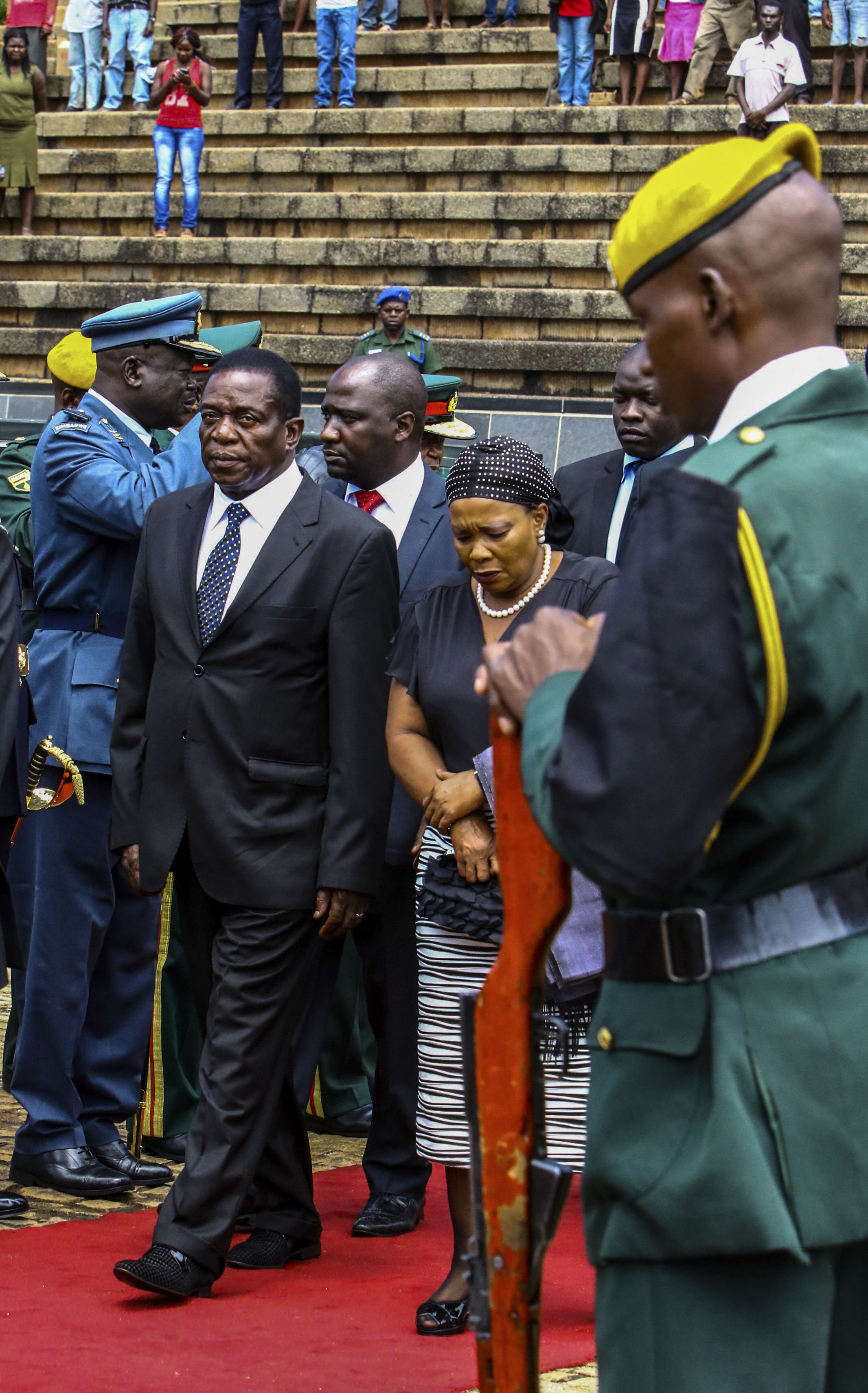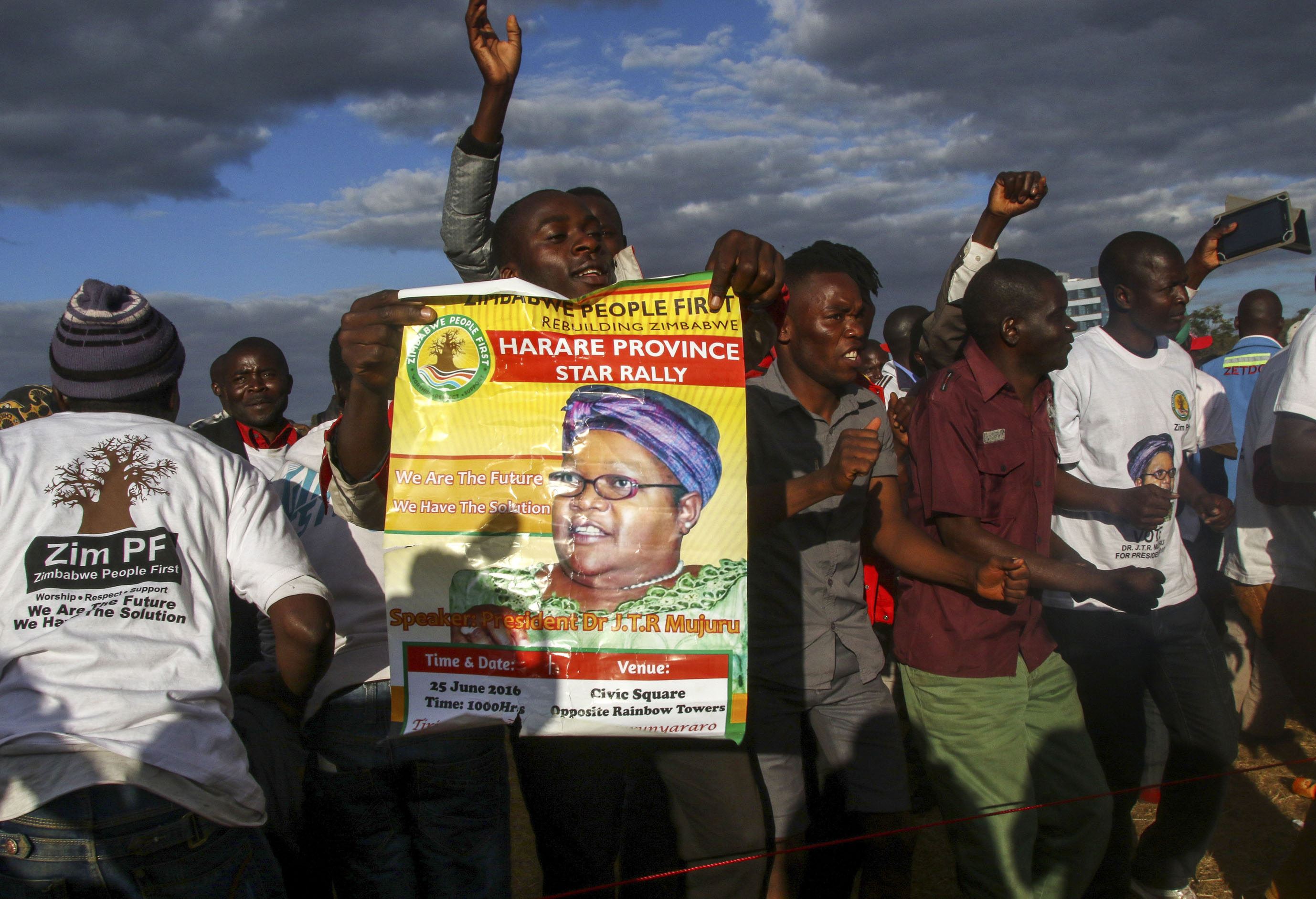Grace Mugabe
NEWS ANALYSIS
Zimbabwe’s long-running succession drama exploded into life on Monday when Robert Mugabe sacked vice-president Emmerson Mnangagwa, who was one of the leading candidates to eventually take over from the president.
Mnangagwa’s sudden demotion is likely to pave the way for Grace Mugabe, the president’s wife, to assume more political power, perhaps even replacing Mnangagwa as vice-president after next month’s ruling party conference.
The 75-year-old Mnangagwa, nicknamed “the Crocodile”, is a hardliner with close links to Zimbabwe’s security services — and a longtime ally of the president, having worked in Mugabe’s office during the liberation struggle in the 1970s.

[The jury is out as to whether axed Zimbabwean vice-president Emmerson Mnangagwa (left, with wife Auxilia) will follow his predecessor, Joice Mujuru, into the political wilderness. His support in the police and defence force and among Zanu-PF veterans may have been overstated, some analysts believe. (Jekesai Njikizana/AFP)]
“I think that this is one of the most significant political events since independence,” said David Coltart, a prominent opposition politician.
“Mnangagwa, more than anyone else, has been Mugabe’s right-hand man. He has been Mugabe’s go-to person on a range of issues, from Gukurahundi [the Matabeleland massacres in the mid-1980s] to the response to the 2008 election to the organisation of the 2013 election. At the very least, Mugabe has broken with the person who has got all that intelligence about how they have done things,” he said.
“And that situation is compounded by the fact that Mnangagwa clearly has the support of a significant segment of war veterans, who have done most of the campaigning for Mugabe in the past … I see this as a desperate move by Mugabe with high potential political cost,” said Coltart.
Mnangagwa may have been officially fired on Tuesday afternoon, but his fate had been sealed several days earlier. At a rally in Bulawayo, a small group of Mnangagwa’s supporters booed Grace Mugabe, prompting a vicious tongue-lashing from her husband. “I am getting insulted in the name of Mnangagwa daily. Did I make a mistake to appoint Mnangagwa as my deputy? If I made a mistake, I can even drop him tomorrow. If he wants to form his party with his supporters, he can go ahead. We can’t have a party riddled with insulting each other daily,” said Mugabe, while a humiliated Mnangagwa looked on.
Fall from grace
Mnangagwa would not be the first potential successor to fall foul of Mugabe. The former vice-president, Joice Mujuru, at one point a contender for the throne, was unceremoniously dismissed from her post by Mugabe in 2014 — and has struggled to remain politically relevant since.

[Former vice president and politician Joice Mujuru. (Jekesai Njikizana/AFP)]
“Emmerson Mnangagwa’s fall from grace has been played out in slow motion over the last few months in another demonstration of internal Zanu-PF theatre that echoes with the purge of his predecessor, Joice Mujuru,” said Piers Pigou, Southern Africa analyst with the International Crisis Group.
“Whether or not Zanu-PF emerges stronger from this latest imbroglio is questionable, and we are yet to see what the repercussions are for those elements of the party and state associated with the former vice-president. Survival will be utmost in the minds of many of those individuals,” said Pigou. “We are in uncharted waters.”
This is especially true for Mnangagwa himself. “We have seen this before,” said Alex Magaisa, a political analyst. “Remember back three years ago, when Joice Mujuru was leaving, it was said that she could not be fired because she was powerful and had a lot of support in Zanu[-PF]. Then she was fired, and there was a view that she could form a party that would be strong. But what we saw with Mujuru is that she was nothing without Zanu[-PF]. And Emmerson knows this.”
Of particular interest will be the reaction of elements in Zimbabwe’s military, police and the ruling party veterans’ association, who have long been portrayed as supportive of Mnangagwa’s succession bid.
But this relationship may have been overplayed in the media, suggests Blessing-Miles Tendi, a professor of African politics at the University of Oxford.
“He only enjoyed strong support from a faction of the military, particularly the faction centred around Zimbabwe Defence Forces commander Constantine Chiwenga. Many figures within the military bore no allegiance to him whatsoever. And the idea that the war vets from the 1970s war backed Mnangagwa, this too was myth-making. Only a faction of the veterans support him,” said Tendi.
Tendi said that Mnangagwa’s lack of combat experience — he never saw frontline action during the liberation struggle — also counted against him with soldiers.
“The key difficulty with Mnangagwa’s legitimacy with the army was that Mnangagwa was never actually a guerilla that saw combat in the war. He joined the liberation struggle in the late 1970s as Robert Mugabe’s special assistant, basically working out of Mugabe’s office and managing intelligence for him. So he never actually saw combat.”
Succession spotlight
Following Mnangagwa’s demotion, the succession spotlight turns to Grace Mugabe, who must now be considered the frontrunner to succeed her husband. Not only is the Crocodile out of the way but, as of this month, she also has the official endorsement of the Zanu-PF Women’s League. This was accompanied by calls for the next vice-president to be female, to ensure gender parity.
An extraordinary Zanu-PF congress in December is likely to anoint Grace as vice-president of the ruling party, with the national vice-presidency to follow suit. This would mean that the Mugabes are nicely set up for a family monopoly over the Zanu-PF ticket in the next presidential elections, scheduled for mid-2018.
Although Grace currently enjoys the upper hand, it doesn’t mean that the succession race is over. The president has long built up potential heirs only to tear them down later, and there are no guarantees that his wife will be an exception.
“There’s been talk from people who say potentially it’s Grace who will take over; it’s in the bag now. My response to that is always with Mugabe’s attitude towards women,” said Tendi.
“Mugabe’s handling of female party members and Cabinet members has always been sexist, misogynistic. Time after time, it is clear that he doesn’t relate to women much as capable political leaders. So I don’t think Grace is his preferred successor.”
Magaisa added: “I think that the Zimbabwean succession race has been unpredictable. It’s easy for us to look with the benefit of hindsight and say it all falls into place, but the reality is, when Mujuru was at the top, we all thought she was destined for the presidency. When Emmerson Mnangagwa took over, many of us thought he was the one. Now we have Grace, I don’t think we should fall into the same trap of thinking it is all locked up.”